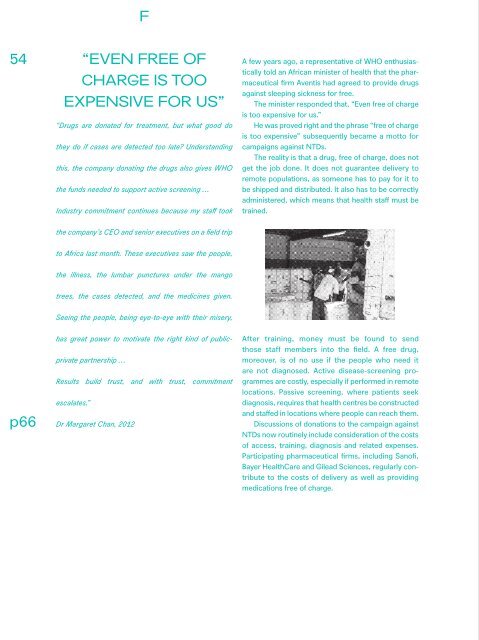Create successful ePaper yourself
Turn your PDF publications into a flip-book with our unique Google optimized e-Paper software.
F<br />
54 “EVEN FREE OF<br />
CHARGE IS TOO<br />
EXPENSIVE FOR US”<br />
“Drugs are donated for treatment, but what good do<br />
they do if cases are detected too late? Understanding<br />
this, the company donating the drugs also gives WHO<br />
the funds needed to support active screening …<br />
Industry commitment continues because my staff took<br />
A few years ago, a representative of WHO enthusiastically<br />
told an African minister of health that the pharmaceutical<br />
firm Aventis had agreed to provide drugs<br />
against sleeping sickness for free.<br />
The minister responded that, “Even free of charge<br />
is too expensive for us.”<br />
He was proved right and the phrase “free of charge<br />
is too expensive” subsequently became a motto for<br />
campaigns against NTDs.<br />
The reality is that a drug, free of charge, does not<br />
get the job done. It does not guarantee delivery to<br />
remote populations, as someone has to pay for it to<br />
be shipped and distributed. It also has to be correctly<br />
administered, which means that health staff must be<br />
trained.<br />
the company’s CEO and senior executives on a field trip<br />
to Africa last month. These executives saw the people,<br />
the illness, the lumbar punctures under the mango<br />
trees, the cases detected, and the medicines given.<br />
Seeing the people, being eye-to-eye with their misery,<br />
p66<br />
has great power to motivate the right kind of publicprivate<br />
partnership …<br />
Results build trust, and with trust, commitment<br />
escalates.”<br />
Dr Margaret Chan, 2012<br />
After training, money must be found to send<br />
those staff members into the field. A free drug,<br />
moreover, is of no use if the people who need it<br />
are not diagnosed. Active disease-screening programmes<br />
are costly, especially if performed in remote<br />
locations. Passive screening, where patients seek<br />
diagnosis, requires that health centres be constructed<br />
and staffed in locations where people can reach them.<br />
Discussions of donations to the campaign against<br />
NTDs now routinely include consideration of the costs<br />
of access, training, diagnosis and related expenses.<br />
Participating pharmaceutical firms, including Sanofi,<br />
Bayer HealthCare and Gilead Sciences, regularly contribute<br />
to the costs of delivery as well as providing<br />
medications free of charge.


